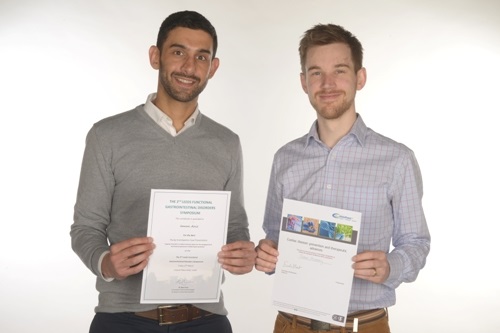Aug 10 2015
Researchers at Sheffield Teaching Hospitals have received awards for their work investigating coeliac disease and irritable bowel syndrome (IBS), two common gastrointestinal conditions.

Dr Imran Aziz and Dr Peter Mooney
Clinical research fellows Dr Peter Mooney and Dr Imran Aziz, based at the Royal Hallamshire Hospital, received the Coeliac UK National Patient Charity research prize and a Young Investigators award respectively.
Dr Mooney’s award was in recognition of his work developing a finger prick blood test which could help to identify people with coeliac disease, a digestive condition caused by sensitivity to gluten, earlier. Coeliac disease currently only has a 25% diagnosis rate.
Standard testing involves a normal blood test followed by a biopsy, but the finger-prick blood test is equivalent in terms of sensitivity and less invasive for the patient. It provides a rapid result within ten minutes, compared to a turnaround of up to two weeks for the standard test.
Dr Mooney said:
Lots of people with coeliac disease go a long time before they are diagnosed, so we wanted to see if we now pick up more people at an earlier stage.
The prize is a national award so it is a nice one to win.
Dr Aziz was presented with his award at the Leeds Functional Gastrointestinal Meeting in recognition of his research into the impact of gluten free diets on patients with IBS. His findings have shown that patients with IBS but not coeliac disease still responded well to a gluten-free diet.
Dr Aziz said:
We found that those people who were naïve to the effects of diet improved with a gluten free diet in about 70% of cases.
The award means a lot to me as the study I presented is a culmination of 3 years of hard work.
Professor David Sanders, Consultant Gastroenterologist at the Royal Hallamshire Hospital, said:
Sheffield Teaching Hospitals is widely viewed as one of the premier gastroenterology units in the country. The success of the clinical services has been underpinned by research with 11 national and international awards since 2010. It is wonderful to see a new generation of researchers flying the flag.